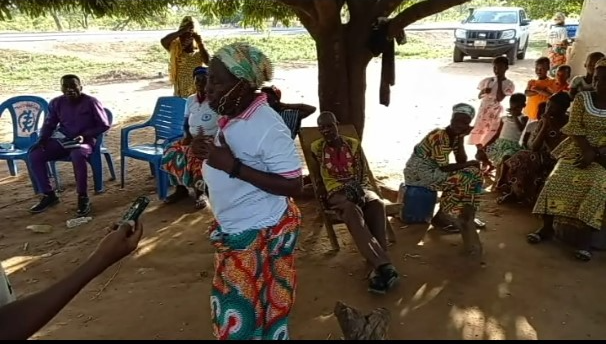Attaining Open Defecation Free status: The story of Blema Community
- Advertisement -
Have you ever imagined that open defecation means that you will eat your own and your neighbour’s faecal matter? By shocking local people with such direct language and confronting them with the realities of open defecation, this was how Blema Number one, a community in the Sawla-Tuna-Kalba district of the Savannah region embraced the Community Led Total Sanitation.
Today, Blema is among 243 out of over 300 communities in the district that have attained open defecation-free status.
- Advertisement -
Residents do not defecate in the open because every household in the community has a household toilet. GBC’s Joyce Kantam Kolamong visited the community and has come through with this report.
- Advertisement -
Blema Number one is a farming community with a population of about 220 with nineteen households. Four years ago before Global Communities, an NGO under its WASH for Health Project funded by USAID, introduced the Community-Led Total Sanitation in the community residents defecated in the open encouraging spread of diseases especially among children.
Four years after its introduction every house has built a latrine. As one enters the community, what greets him or her is the clean environment. A large number of latrines have been constructed with locally available materials and plastered with shea butter and cow dung. Others have also been built with blocks. The community has improvised handwashing facilities made from jerrycans or gallons with soap to encourage the practice of handwashing. Global Communities in its effort to improve access to water and deepen the sanitation situation has also provided the community with a borehole. Most communities in the district have been declared open defecation free.

All communities report health improvements such as reduction in diarrhoea and vomiting, particularly among children. Along with improved access to latrines, overall environmental sanitation and personal hygiene have improved. Communities feel a great sense of ownership of the CLTS project and have developed their own systems, such as fund generation, to maintain the facilities.
Kontinantey Donchile, a farmer and a Natural leader who serves as a community consultant facilitating change at Blema Number one and its adjoining communities, said residents were shocked when staff of Global communities made them realised they were eating their own fecal matter.
“After we got to know this shocking revelation, we decided that every house should build a toilet and that is how we were able to attained the open defecation free status,” Mr. Donchile said, adding that, “since we had our toilets, we do not experience sicknesses such as cholera and now because we do not go out to defecate, the incidence of snake bites have reduced drastically in the community.”
At a short community meeting at Blema Number one to interact with residents about the impact of being open defecation free community after four years of embracing the CLTS, some of the women were so elated and shared interesting stories.
- Advertisement -
According to them, open defecation prevented them from consuming some nutritious vegetables and leaves but now the situation has changed. They said stunted growth among the children has significantly reduced. One of the key benefits cited by the women is the positive effect of CLTS on women and girls in terms of privacy, time saved, and freedom from embarrassment.
A 51-year-old groundnut farmer, Akua Dagaati, said, “I am thanking Global communities for the intervention. Before the NGO came to this community, we use to defecate in the open. During that time, we do plant vegetables but we cannot eat them because of the feaces around but now it is no more. In fact, this time building the toilets has given us privacy for women and girls.”
A 45-year-old farmer with eight children, Ansoyin Susanna, said, “Because we can now eat some vegetables and leaves which we could not eat those days, our children are healthy now. The sicknesses we use to see among children are no more in the community.”
The Chief of Blema, Sei Morlan, commended Global Communities and its partners for such an intervention. He said the community recorded high mortality rate among fowls reared in the community at the time when open defecation was the norm but now, they no longer experience that phenomenon.
“I want to thank Global communities for the work they have done in the community here. Gone are the days when people travel and eat fowl meat that is affected, when they come and do open defecation, it leads to most of the fowls dying. But these days because we have toilets in the community even if you go and eat anything and come back, it cannot spread. The fowls are the source of income and since they are not dying anymore, we are also getting something.”

The District Environmental Health Officer, Abubakari Saddique Dauda, said the assembly partnered Global Communities in terms of logistics, human resource to yield the needed results.
Global Communities was the first NGO to start the implementation of CLTS in the Sawla-Tuna-Kalba district in 2016. Today, more than 243 out of the over 300 communities in the district have attained ODF status. The Programme Coordinator for the Northern Zone, WASH for Health, Dominic Dapaah, said the goal of the sanitation intervention is the increased use of household sanitation to help reduce or/and completely stop sanitation related diseases and problems from its project areas.
CLTS is a success story, not due to its potential for contributing towards several Sustainable Development Goals but local people have developed great pride and a sense of ownership of their toilets and in ensuring their villages are clean.
Source: Joyce Kantam Kolamong || gbcghanaonline.com
- Advertisement -


